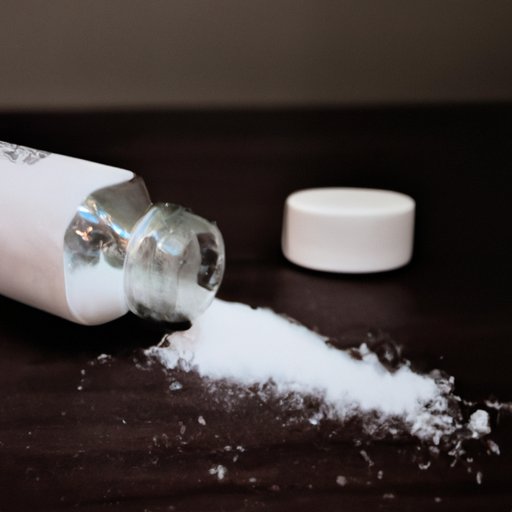Introduction
Smelling salts, also known as ammonia inhalants, are chemical compounds used to revive or invigorate someone who has lost consciousness. They have been used for centuries in various forms and for a variety of purposes. Today, they are most commonly used by athletes, military personnel, and first responders. In this article, we’ll explore the potential health risks and benefits of using smelling salts, as well as examine their traditional and contemporary uses.
Examining the Potential Health Risks of Smelling Salts
Smelling salts consist of three main components: ammonium carbonate, water, and perfume or fragrances. When inhaled, the ammonium carbonate stimulates the trigeminal nerve, which is responsible for sensations such as smell and taste. This stimulation causes an increase in heart rate and blood pressure, as well as a rush of adrenaline.
Inhaling the components of smelling salts can cause a variety of side effects, including dizziness, headaches, nausea, and vomiting. Overuse can lead to more serious health issues, such as respiratory problems, increased risk of stroke, and heart palpitations. According to Dr. Robert Glatter, an emergency physician at Lenox Hill Hospital in New York City, “The use of ammonia inhalants can be dangerous, especially if used excessively or without proper medical supervision.”
Exploring the Pros and Cons of Using Smelling Salts
When used properly, smelling salts can provide a number of benefits. For athletes, they can help them focus and increase alertness before a competition. For military personnel and first responders, they can provide an energy boost before going into a dangerous situation. They can also be beneficial for those experiencing fainting spells, as they can help restore consciousness.
However, there are some drawbacks to using smelling salts. Overuse can lead to adverse health effects, as mentioned above. Additionally, the use of smelling salts can mask underlying medical conditions that may be causing a person to faint or lose consciousness. If these conditions are not addressed, the person may be at risk for further health complications.

Investigating How Smelling Salts Affect Your Health
The short-term effects of smelling salts are typically mild and subside quickly. However, overuse can lead to serious health complications, such as respiratory distress, increased risk of stroke, and heart palpitations. Long-term effects are not yet known, as research on the topic is limited.

Comparing Traditional Uses of Smelling Salts to Contemporary Uses
Historically, smelling salts were used to treat a variety of ailments, from headaches to depression. Today, they are primarily used to revive or invigorate someone who has lost consciousness. They are also used by athletes, military personnel, and first responders to improve focus and alertness.
Analyzing the Side Effects of Smelling Salts
The side effects of smelling salts are typically mild but can become more severe with overuse. Common symptoms associated with overuse include headaches, dizziness, nausea, and vomiting. If you experience any of these symptoms after using smelling salts, it is advised to stop using them and seek medical attention.
Treatment for these side effects will depend on the severity of the symptoms. Mild symptoms can usually be treated with rest and hydration. More severe symptoms may require prescription medications or other treatments.

Understanding the Benefits and Drawbacks of Smelling Salts
Overall, the use of smelling salts can provide a number of benefits, such as improved focus and alertness, increased energy levels, and the ability to revive someone who has lost consciousness. However, there are also potential risks associated with their use, such as headaches, dizziness, nausea, and vomiting. Overuse can also lead to more serious health complications.
Conclusion
In conclusion, smelling salts can provide a number of benefits when used correctly. However, it is important to understand the potential risks and be aware of the potential side effects. It is recommended to consult with a doctor before using smelling salts, and to stop using them immediately if any side effects occur. With proper use, smelling salts can be a safe and effective way to invigorate yourself or revive someone who has lost consciousness.
(Note: Is this article not meeting your expectations? Do you have knowledge or insights to share? Unlock new opportunities and expand your reach by joining our authors team. Click Registration to join us and share your expertise with our readers.)
